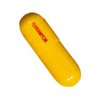INDICATIONS
Terramycin is used for treating infections caused by certain bacteria. Terramycin is a tetracycline antibiotic. It works by slowing the growth of sensitive bacteria by interfering with the production of proteins needed by the bacteria to grow. Slowing the bacteria's growth allows the body's defense mechanisms to destroy them.
INSTRUCTIONS
Use Terramycin as directed by your doctor.
- Take Terramycin by mouth on an empty stomach at least 1 hour before or 2 hours after eating.
- Take Terramycin with a full glass of water (8 oz/240 mL). Do not lie down for 30 minutes after taking Terramycin.
Use Terramycin as directed by your doctor.
- Take Terramycin by mouth on an empty stomach at least 1 hour before or 2 hours after eating.
- Take Terramycin
- If you also take antacids containing aluminum, calcium, or magnesium; preparations containing bismuth, iron, zinc, or sodium bicarbonate; or calcium rich foods (eg, milk, dairy products, calcium-enriched juices), do not take them within 2 to 3 hours before or after taking Terramycin. Check with your doctor if you have questions.
- To clear up your infection completely, take Terramycin for the full course of treatment. Keep taking it even if you feel better in a few days.
- If you miss a dose of Terramycin, take it as soon as possible. If it is almost time for your next dose, skip the missed dose and go back to your regular dosing schedule. Do not take 2 doses at once.
Ask your health care provider any questions you may have about how to use Terramycin.
STORAGE
Store Terramycin at room temperature, between 68 and 77 degrees F (20 and 25 degrees C). Keep away from heat, moisture, and light. Do not store in the bathroom. Keep Terramycin out of the reach of children and away from pets.
MORE INFO:
Active Ingredient: Tetracycline.
